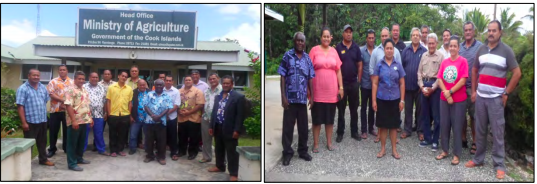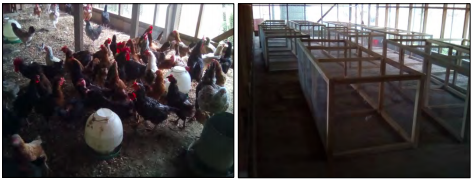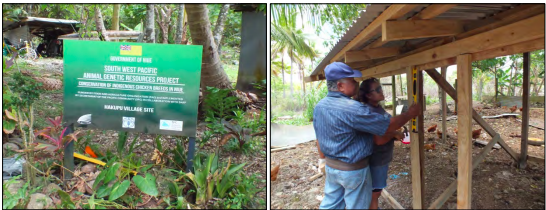The Promotion of indigenous pig and chicken breeds in Fiji, Niue and Cook Islands through the marketing and consumption project was designed to promote marketing and consumption of indigenous livestock breeds which were endemic in most of the PICTs but the products were inaccessible to consumers. The project was funded by the Perez-Guerrero Trust Fund (PGTF). The Secretariat of the Pacific Community was the implementing agency in collaboration with the Ministries and Departments of Agriculture and Livestock in the participating countries of Fiji, Niue and Cook Islands. SPC as a lead implementing body had started some implementation of the activities according to the work plan that was developed. Although the implementation of activities had started the whole programme was affected by the impacts of the Tropical Cyclone Winston which hit Fiji on the 7th of February 2016, this affected most parts of Fiji including some of our proposed farms and farmers. Since SPC was heavily involved in assisting rehabilitating farmers that were affected by the cyclone, a no-cost extension of the project duration was requested and approved by the UNDP Secretariat, extending the completion date for the project from July 2016 to the 31st January 2017.
Project introductory meetings;
One of the main activities that had to be implemented immediately was the conducting of introductory workshops in the participating countries. These workshops were conducted by SPC in the 3 countries to create awareness and introduce the objectives of the project activities to achieve the proposed outputs. The staff of SPC conducted the workshops with the staff of the Fiji Animal Health & Production Division, Ministry of Agriculture and also made international travels to Niue and the Cook Islands to introduce the project and its aims to the ministries and departments in those two other countries. The workshops assisted SPC better collaborate with the Ministries and department to identify sites, identify host farmers and to confirm activities for implementation in the countries. In Fiji, the project was introduced to the Ministry of Agriculture, Animal Health and Production Division as well as potential farmers. In Niue, the project was introduced to the Department of Agriculture staff including the Permanent Secretary and the senior staff of the Department as well as to potential farmers through a workshop. In the Cook Islands, an 4 introductory workshop was also held with the senior livestock staff and the Permanent Secretary for their awareness and action as well as to potential farmers.

workshops funded by the PGTF in 2015
Assisting Pig and chicken Farms, Fiji. Niue and the Cook Islands
The project in consultation with the Ministry of Agriculture, Animal Health and Production Division identified sites established under the FAO Animal Genetic Resources Conservation and Multiplication Project was used as the sites for the Promotion of indigenous pig and chicken breeds for marketing and consumption project. This decision was based on utilising the established sites which were currently operational thus further improve production, marketing and have sustainable sales of pigs chickens and edible eggs. The following sites were identified and assisted;
Fiji:
Koronivia Indigenous Pig Conservation Centre, Koronivia, Fiji
The Indigenous pig conservation, multiplication and distribution centre that was built at the Koronivia Pig Research Station (KRS) under the AnGR Conservation Project was used to promote indigenous pig breeds for marketing and consumption under the Perez-Guerrero Trust Fund (PGTF) Project. Breeding stock of pigs for the centre was collected from five sites from around the islands of Fiji and these were: Cicia, Taveuni, Savusavu, Matuku and Gau. The main purpose of the exercise was to collect a good range of indigenous pigs for breeding, conservation and multiplication of these pig breeds under the PGTF project. The villages on those sites where the pigs were sourced were recorded and their physical traits were used as a basis for their selection. The PGTF promotion project then focussed on the first cycle of breeding of the indigenous pigs to multiply their numbers, where offspring were then selected based on the physical traits for further breeding purposes. In other words, those offspring’s that had more hybrid physical traits were culled and those that had more indigenous traits were retained for breeding. Awareness was also carried with potential farmers in Fiji on the potential to raise indigenous pigs as a source of livelihood. This was part of the project aim and that was to eventually distribute indigenous breeds of pigs for farmers to raise and supply the offspring to the domestic markets around Fiji. 5 Some blood samples were also collected from the indigenous pigs at the centre in Koronivia and are awaiting funds for DNA analysis.

Happy Chicken” Farm, Sigatoka, Fiji
The Promotion of indigenous livestock project (PGTF) also assisted an indigenous chicken breeding and distribution farm called the “Happy Chickens” which is located at the Sigatoka valley, on Viti Levu, Fiji. The PGTF project has assisted this farm through the procurement of incubators, i.e. setters and hatchers as well as with building materials to improve the poultry hatchery on the farm. Chicken breeding sheds have also been expanded with the PGTF project and to increase the numbers of local chicken breeders on the farm. The farm and the hatchery have the aim to increase the production of fertile eggs and local chickens for breeding and to distribute them to interested farmers who would raise them for meat and eggs improving food security and livelihoods in the Sigatoka Valley. The farm has also been doing capacity building training with the local communities in Fiji and other Pacific Island countries to improve chicken husbandry and management and at the same time conserve local chickens through breeding. In Sigatoka (Fiji), the farm assisted women’s groups in 2 villages with the provision of capacity building training as well as through the provision of local chickens and small chicken incubators. The farm has also carried out chicken husbandry training with participants from Vanuatu that were associated with the Bahai Centre to empower local communities to improve food security with the use of local chickens and local feed ingredients.

station in Sigatoka, Fiji
Nacocolevu Research Station chicken farm The Nacocolevu Research Station is a facility that does research in livestock and crops and under livestock research, they have a chicken component. The chicken research component has a breeder farm and a hatchery. The aim is to collect and multiply indigenous chickens that are climate impact tolerant as well as create livelihoods and improve food security in the Sigatoka valley area. In Fiji, there is a demand from farmers to raise and sell local indigenous chickens, so the research station farm has been working towards that by increasing the size of their breeder farm to increase the number of fertile eggs for hatching. In addition to the production of fertile eggs and day-old indigenous chickens, the farm is also interested in research on the performance of the indigenous chickens collected and bred on their farm. Performance such as egg production, hatchability of fertile eggs, growth rates to local feed consumption and mortality are some of the areas that are currently being looked at. The PGTF project assisted the farm to improve their sales and distribution, hatchery as well as their research component by assisting them with planning and with the provision of equipment to increase their production capacity as well as carry out research on performance. The findings from the research are preliminary at this stage.

Niue
Breeding, multiplication and conservation chicken centres, Niue
Three chicken conservation, multiplication and distribution farms were assisted in Niue under the AnGR promotional project. The sites have been multiplying indigenous chickens with the use of local feed ingredients supported by some commercial feed and awareness has been created on the sales and consumption of edible eggs and meat from indigenous chickens. The three sites are located in the villages of Hikutavake, Mutalau and Hakupu.

for indigenous chickens at Hikutavake funded by the PGTF project

Cook Islands:
Breeding, multiplication and a conservation centre, Cook Islands
Two farms were established under the AnGR promotion project on Rarotonga in the Cook Islands; these were the Takamoa Theological farm and the Tai Areai-Avatiu farm to breed local chickens for breeding, multiplication and conservation. The promotion project utilised the facility to promote local chickens for breeding, multiplication, marketing and consumption. Also, some blood samples were collected from the Cook Islands for DNA analysis and the samples are currently stored at SPC awaiting funds for analysis.
AnGR Video:
An animal genetic resources video was done to promote the work on indigenous chickens and pigs in Fiji and this video was played on the Pacific Way television program in Fiji and the Pacific South West region at the end of 2017. This was funded by the PGTF project. The video is available on the SPC youtube channel and could be downloaded and viewed via the following link: https://youtu.be/w3MqOQ4yPE0